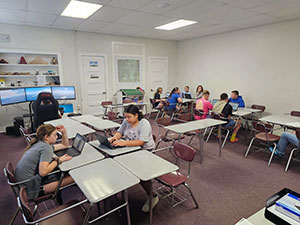In the world of science education, finding tools that engage students while meeting rigorous state standards can be challenging. However, for Kris Larsh, Science, STEM, and Career teacher at Stonewall/McLish Public School, Research Quest has become an invaluable resource in achieving these goals.
Oklahoma state standards require students to go beyond mere understanding of scientific concepts. They must develop critical research skills to explore and apply these concepts in depth. Kris found that Research Quest perfectly aligns with these requirements:
"Research Quest has really helped my students develop the research skills needed to meet state requirements," Kris explains. "This platform not only reinforces the scientific method but also gives students insight into the roles of career scientists."
Kris particularly emphasizes the value of two Research Quest sets of investigations:
These investigations have been pivotal in preparing students for competitive science fairs, demonstrating the real-world applicability of the skills learned through Research Quest.
 The impact of Research Quest extends beyond the classroom. Kris proudly shares, "Last year I had 3 teams win category champions in the National Indigenous Science Fair with AISES." This achievement underscores the effectiveness of Research Quest in nurturing not just understanding, but also practical application of scientific research skills.
The impact of Research Quest extends beyond the classroom. Kris proudly shares, "Last year I had 3 teams win category champions in the National Indigenous Science Fair with AISES." This achievement underscores the effectiveness of Research Quest in nurturing not just understanding, but also practical application of scientific research skills.
By integrating Research Quest into his curriculum, Kris has observed a significant improvement in his students' ability to:
Kris Larsh's experience with Research Quest at Stonewall/McLish Public School exemplifies how innovative educational tools can bridge the gap between curriculum requirements and practical skills development. By fostering research-based learning, Research Quest is not just helping students meet state standards – it's preparing them for future success in scientific fields.
As educators continue to seek ways to engage and challenge their students, platforms like Research Quest prove that interactive, research-focused learning can make a substantial difference in science education.